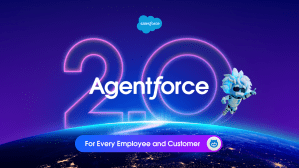Amid the challenges of the past year and shift to remote work, digital and the move to the cloud have truly become imperatives for all businesses. In 2020, Salesforce Ventures kept its strategic focus and invested in the next wave of leading enterprise companies in automation & AI, remote work & collaboration, data, open-source developer tools and security.
With investments in more than 40 new companies globally, with $3B capital deployed since 2009, 2020 proved to be the most active year for Salesforce’s investment arm. In this interview, Matt Garratt, Managing Partner at Salesforce Ventures, discusses how last year accelerated the move to digital for companies around the world.
Q. Despite the pandemic and remote work, Salesforce Ventures just had its most active investment year yet – what do you think contributed to that?
What’s really become clear through the pandemic, is that digital transformation has become such a huge imperative for companies. We’ve seen this roll out in stages, and the surprising thing is that transitions that we thought would take a decade or more got pulled way forward. This includes everything from allowing people to work from home remotely, whether that’s through Zoom, or spinning up remote customer service and sales use cases.
Amidst this, we’ve invested in companies that focus on collaboration and the need for increased reliance on remote work such as Hopin and TalkDesk. We’ve also focused on companies that support the move to digital when it comes to data sharing and security, like Tanium and Auth0.
Q. What were some of Salesforce Ventures biggest milestones from this year? What was significant about them?
It was a huge year for us, our most active year. We made 47 new investments, celebrated three IPOs, including Goodpatch, nCino and Snowflake, and 16 of our portfolio companies were acquired. We continue to see a proliferation of investments outside the U.S., with over 50 percent of our investments in 2020 being outside the U.S. We’ve also launched the Black Venture Institute, a partnership with BLCK VC, Operator Collective, and UC Berkeley Haas to foster more equity in the venture capital industry by increasing the number of Black venture investors. In addition we committed $100 million to invest in underrepresented minority founders. And we launched a $100 million Impact Fund to support innovative companies driving positive social change.
Q. The Impact Fund is the second one to launch. Tell us why impact investing is so important.
There’s never been a more important time for businesses to join together and become a force for good. As we all know, we’re in the midst of unprecedented times right now, facing several challenges. There is a health crisis, an economic crisis, a climate crisis. Increasingly, businesses are stepping in to help solve the issues.
In 2017 we launched a $50 million Impact Fund, and the first one was incredibly successful. So we’re more than doubling down to continue to go after this initiative. This Impact Fund accelerates the growth of cloud companies addressing issues, including education and reskilling, climate action, diversity, equity and inclusion, and providing tech for nonprofits and foundations.
Q. Can you share a bit about the Black Venture Institute that Salesforce Ventures launched this year with BLCK VC and Operative Collective? How does this fit in with our journey as a company?
Equality has always been a core value at Salesforce, and everything we’ve done at Salesforce Ventures has incorporated and integrated the company’s core values. Venture capital has such a powerful possibility to create change, and can do so not only through deployment of capital, but also by elevating the voices of venture capitalists.
We’ve looked at the number of venture investments that are from underrepresented minorities and black VCs, and these numbers are very low. So we got together with Operative Collective and BLCK VC, which is the leading nonprofit for Black venture capitalists, and created Black Venture Institute, an intensive, curriculum-based program, as well as continuing education, to give established Black operators the education, experience, and connections they need to become angel and venture investors.
We have a goal to increase the number of Black check writers by five times by 2023.
Q. What advice do you have for start-ups and entrepreneurs facing the unprecedented challenges this year has brought? What advice do you have for startups and entrepreneurs in these unprecedented times?
As I’ve mentioned, digital transformation has accelerated many aspects of business, so my advice would be for entrepreneurs to take advantage of that opportunity. With the increase in remote work, and other shifts that have been brought on by the pandemic, there are systematic and fundamental changes going on that present a new opportunity for growing companies. Find something that you’re passionate about, something you are excited about and really go after that.
Now is a good time, or maybe even the best time, to go and start a new company. The tools and solutions are getting better, and they’re allowing smaller teams and individuals to have more powerful technologies—ones that can help them solve problems.
AI will continue to make applications smarter and as you get more data, with better fidelity of the data, the impact of AI only increases.
— Matt Garratt
Q. You talk to CEOs in the Salesforce Ventures portfolio all the time. What challenges are they preparing for in the new year and how does your team help them?
They have faced many challenges, especially in terms of managing remote work when they can’t be with their teams. This has put a lot of additional strain on companies and leaders to motivate their teams and work with team members to continue to grow their businesses.
We work very closely with our companies in all these areas, and provide them access to Salesforce executives and leaders so they can get questions answered regarding any specific operating challenges that they might be facing. We’ve created a community with our CEOs and portfolio companies, encouraging them to share best practices. We’ve been talking a lot with our CEOs lately about the mental health of their employees, and how much burnout and stress that they’re facing. I think it’s very valuable for them to have this community.. They’re all focused on enterprise software, facing similar challenges, and many of them can benefit from the operating advice that we can provide as one of the cloud pioneers and cloud leaders.
We also launched our Enterprise Technology Pulse Survey this year to look at the evolving outlooks of our CEOs and how they were dealing with the challenges brought on by the past year.
Q. Looking forward to 2021, what trends or predictions do you see for enterprise technology?
We are big believers in digital transformation, and its acceleration. I don’t think that there’s going to be a pullback of this acceleration. Instead, it will grow. Once you start moving to the cloud and bring in more cloud solutions, digital transformation builds on itself. We think data is going to be the lynchpin in the era of digital transformation. With Salesforce Customer 360, you get a holistic view of your customers and their data at all touchpoints. Access to that will make a big difference for many businesses. Data has to be able to move across the enterprise seamlessly and securely, and that concept is behind a number of investments that we have made in companies like Snowflake.
We have to break down the monolithic applications and workflows that have historically been tied to specific business operations, such as sales and marketing. The workflows need to move toward automation, driven by artificial intelligence (AI). AI will continue to make applications smarter and as you get more data, with better fidelity of the data, the impact of AI only increases. So we think that platforms that enable data-driven AI will unlock many opportunities. And believe that collaboration will continue to drive smart remote working.
Q. What are you most excited about thinking about next year?
We hired many new faces in 2020 and many have not met one another, and I am very excited about the opportunity for the team to get together. And also, spending time with CEOs and portfolio companies that I haven’t seen in person in quite some time is something I look forward to getting back to. I continue to be optimistic about the role that the cloud industry is playing in helping to solve a lot of the problems that we’re seeing right now.
This movement toward digital transformation is only going to continue, and that is something to be excited about as well.



















